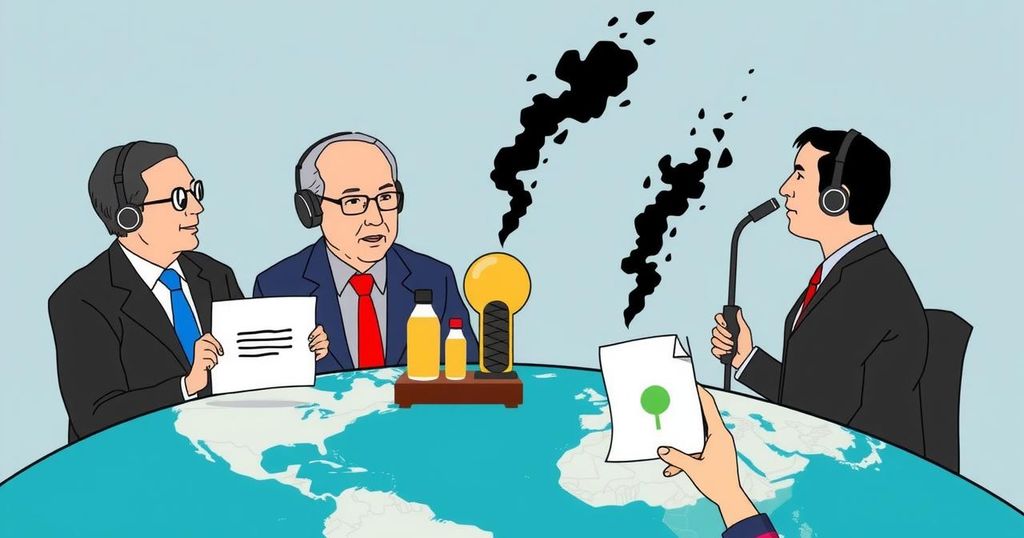As COP29 approaches, notable figures are withdrawing from the climate conference, highlighting a crisis of confidence in the UN’s climate talks. Increased fossil fuel lobbyist presence raises concerns about the integrity of these discussions. Calls for reform suggest excluding odd actors misaligned with global climate goals, as meaningful collaboration is sought to address pressing climate issues. Brazil’s upcoming COP30 presents a potential pivot point for enforcing stricter attendance policies.
As the COP29 climate conference in Baku, Azerbaijan, draws near, notable figures such as heads of state and activists have opted out of participation, citing various reasons ranging from personal issues to concerns regarding Azerbaijan’s human rights record. This trend illuminates a significant crisis of confidence within the annual UN climate talks, particularly in light of record-breaking global temperatures and a perceived ineffectiveness of the COP process after three decades of operation. Many stakeholders now assert that the fossil fuel lobby’s overwhelming influence at these talks represents a major obstacle to meaningful climate action.
The COP meetings have historically been positioned as critical forums for global climate agreements, with notable milestones including the Kyoto Protocol and the Paris Agreement. However, recent COPs, especially the last three held by oil-rich nations, have seen a surge in fossil fuel representation which, critics argue, compromises the legitimacy of the discussions. Former U.S. Vice President Al Gore has voiced strong concerns, characterizing this growing influence as a capture of the process by fossil fuel interests. The alarming presence of lobbyists at COP meetings raises the question of their actual role: either as facilitators of green policies or as potential obstructors.
In recent discussions, climate activists and former UN officials have called for significant reform. They propose stricter criteria for the participation of fossil fuel companies, arguing that their presence undermines the integrity of climate negotiations. Suggestions include limiting attendance to nations committed to the Paris Agreement and excluding organizations that do not align with UN climate goals. The ongoing presence and power of fossil fuel representatives not only crowd out the voices of climate-vulnerable countries but also misrepresent the conference’s aims.
Despite these challenges, some advocate for collaboration with fossil fuel interests rather than outright exclusion. The former UN climate chief Yvo de Boer highlights the necessity of engaging with countries that depend economically on fossil fuels. He argues that the UNFCCC’s consensus decision-making process must honor these varied interests, thus complicating the quest for a straightforward conflict-of-interest policy. In line with this, a register of lobbyists has been proposed, aiming to create transparency and limit undue influence in climate policy decisions.
Looking ahead to COP30 in Brazil, the opportunity to address fossil fuel influence may present itself more forcefully given the nation’s significant environmental commitments. Brazil’s leadership, particularly figures such as Environment Minister Marina Silva, is expected to take a strong stance against the fossil fuel industry. As climate action continues to evolve, the key challenge remains reconciling economic dependencies on fossil fuels with the urgent need for a sustainable climate policy.
This discourse centers on the critical challenges faced by the COP (Conference of the Parties) meetings, organized under the UN Framework Convention on Climate Change (UNFCCC). These meetings have traditionally aimed to foster international agreements on climate change mitigation. However, as global temperatures reach alarming heights, doubts regarding the efficacy of COP meetings have proliferated, largely attributed to the growing influence of fossil fuel interests. The recent critiques emphasize the need to re-evaluate the role of fossil fuel companies in these discussions, considering their potential conflict of interest and the implications for climate policy effectiveness.
The increasing prominence of fossil fuel lobbyists in COP meetings poses a significant challenge to global climate discussions. Key voices within the climate advocacy community are now advocating for reforms that could restore the indicative nature of these conferences. With Brazil set to host COP30, there exists a pivotal opportunity to redefine the parameters of participation and make substantial strides toward genuine climate action, steering the discourse away from fossil fuel dependency.
Original Source: www.corporateknights.com






